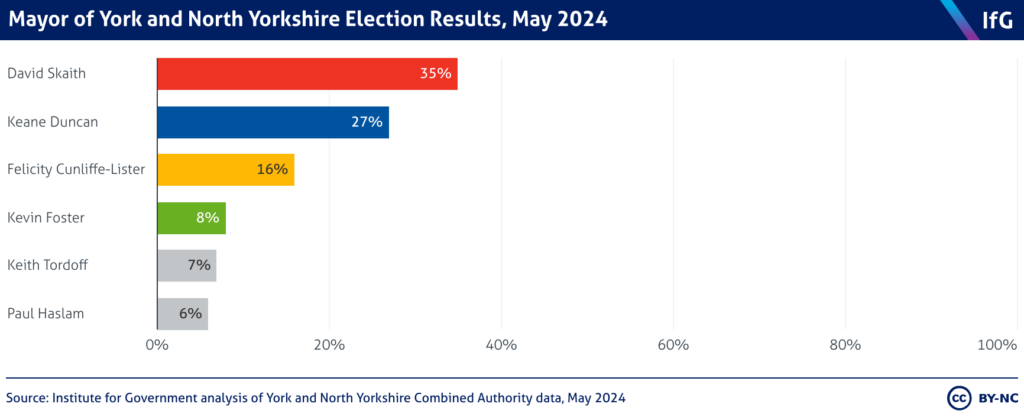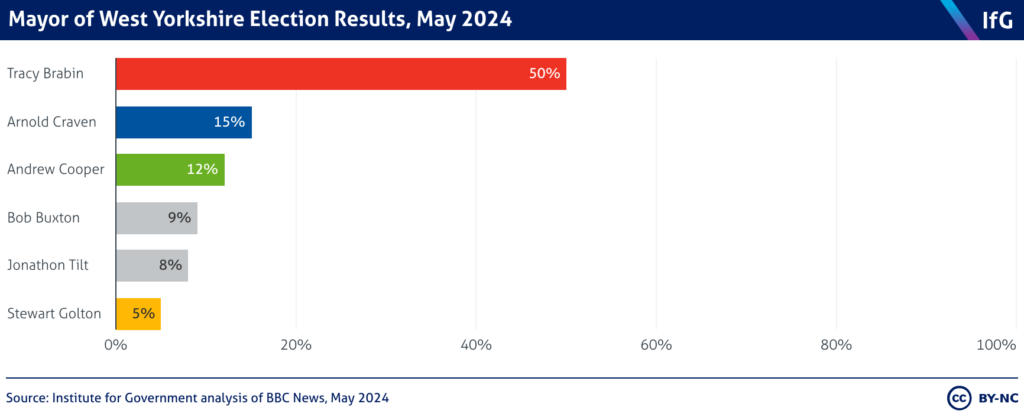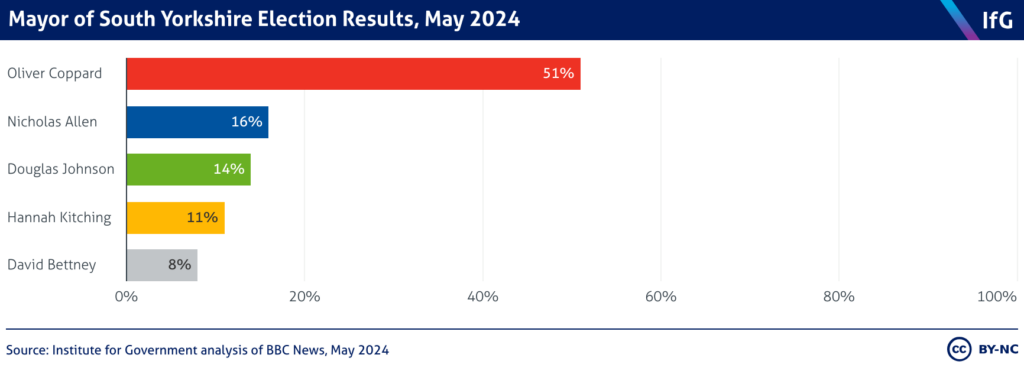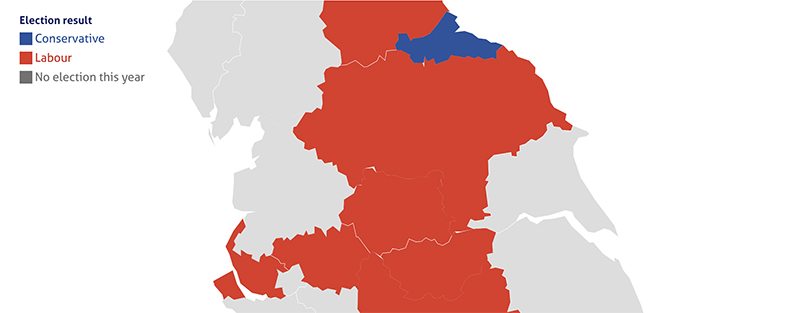Y-PERN’s Chief Policy Fellow, Dr Andy Mycock reflects on the mayoral and local election results in Yorkshire and the Humber and what it could mean for Y-PERN and YPIP’s ongoing mission.
The local and combined authority elections held across the Yorkshire and Humber region in May 2024 provide some important insights into how the political and electoral ‘tectonic plates’ shifted. The overall voting patterns across Yorkshire and Humber were largely similar to those across the rest of England. Labour’s share of the overall vote (about 35%) was similar to last year. The local elections gave us some indication of the likely outcomes in a general election, but the Blackpool South by-election was likely a more insightful indication of where the country stands in terms of national party politics. Below are some headline thoughts on our region:
Mayoral Elections
The mayoral election in York and North Yorkshire (YNY) provided the headline result in the region, with David Skaith (Labour) beating Keane Duncan (Conservative) by almost 15,000 votes. Skaith’s campaign centred on local economic growth while not making any significant spending commitments.
One significant point of note was the turnout of 191,279 (just under 30%) – higher than many expected and a positive sign of initial recognition and buy-in from voters for the new combined authority (and in line with most previous initial mayoral elections in England).

Skaith will seek to hit the ground running and will welcome the proactive approaches to pre-election engagement by our Y-PERN universities in supporting the YNY Mayoral Combined Authority (MCA) transition team. Y-PERN will actively seek to develop existing relationships with YNY MCA officers and also the new mayor’s advisory team.
The other two mayoral contests went as many expected – with Tracy Brabin and Oliver Coppard both winning comfortably. Comparisons with previous elections in terms of party support are somewhat difficult due the change in voting system to ‘first past the post’. Brabin received just over 50% of the vote share, as did Coppard (50.9%). Both mayors and officers in the Combined Authorities in South and West Yorkshire will likely be concerned about the somewhat poor turnouts in relatively mature Combined Authorities. While South Yorkshire turnout increased marginally from 2022 (26.4%) to 27%, West Yorkshire’s turnout dropped from 36.5% to 32%, a surprise considering local elections were held across the region on the same day.


Key Takeaways
The victorious Labour mayoral candidates all showed restraint in the policy remit of their manifestoes, largely resisting the temptation to speak to policy areas beyond their current delegated powers. Moreover, the focus of all the mayoral candidate manifestoes spoke strongly to the shared work of predominant Y-PERN and YPIP areas of interest (climate/sustainability, local economic growth and skills, transport, arts and culture). Furthermore, the shared focus of Y-PERN and YPIP on enhancing the reach and resonance of community engagement could help support future voter engagement with the Combined Authorities and turnout in elections.
Local Elections
As expected, Labour also had healthy returns in many of the local council elections across the region. It is interesting to note that support was not however as sizeable in terms of vote share (35%) as the 1996 local elections (43%) which preceded the 1997 general election. This in parts reflects that Labour has been in power in many local authorities across the Yorkshire and Humber region for some time and some of the issues concerning finances and governmental competency are viewed by the electorate to reside at local as well as national level.
Overall, Labour-led councils strengthened their hold on power, but with some notable exceptions. All five local authorities in West Yorkshire remained Labour-led, but the party lost overall control in Kirklees; they remain the largest party there but new Kirklees Labour party group leader, Carole Pattison, will need to work with other political parties to address significant fiscal challenges facing the council. They also lost some councillors in Bradford. However, this should not impact too strongly on any forthcoming general election as voting switches have taken place in wards where Labour has very strong existing support.
In South Yorkshire, Sheffield City Council remains in no overall control (NOC), with Labour still leading the council as the largest party. Barnsley and Rotherham also saw Labour make modest gains. Notable across West and South Yorkshire was some growth in the Green and Lib Dem vote and councillors, and the relative success of Reform UK where they took votes from all the main parties (though they didn’t stand candidates in many seats).
In Hull, the Lib Dems fought off a strong Labour challenge to maintain control of the Council (Labour made a gain of one councillor). There were no elections in East Riding, but the other notable result was Labour taking the Humberside Police and Crime Commissioner post from the Conservatives (this has not been connected to the forthcoming mayoral role in Hull and East Riding MCA). The turnout was very low at 17%. There were no local elections in York and North Yorkshire.
Key Takeaways
The overarching messages is that the political landscape is both increasingly monochrome in one sense, as Labour is now in control of most local authorities across the region and the three mayoral roles. This will see some closer synchronisation of local and sub-regional policymaking in each of the three areas with a mayor. This noted, the political landscape remains complex and often influenced by a range of local, regional and national issues.
The Next Steps
Y-PERN and YPIP will continue to seek to support local and combined authorities across the region by listening and learning from our local and combined authority officer and elected representative colleagues. Our collective mission is to enhance cross-local and combined authority capacity and collaboration across the Yorkshire and Humber region. The emergence of the Policy Campus in Sheffield – which is part of a growing civil service footprint beyond Whitehall – is another significant opportunity for Y-PERN and YPIP to build multi-level policymaking capacity across the region.
Multi-level and cross-regional collaboration facilitated and supported by Y-PERN and YPIP will though need to adapt to the widening remit of our region’s Combined Authorities – particularly in the areas of local economic strategy and growth – as regional devolution deepens at a time of limited resources for some of local authorities. The forthcoming UK general election will also provide new challenges and opportunities for local and combined authorities, further highlighting the importance of collaboration with the region’s universities through Y-PERN and YPIP.





